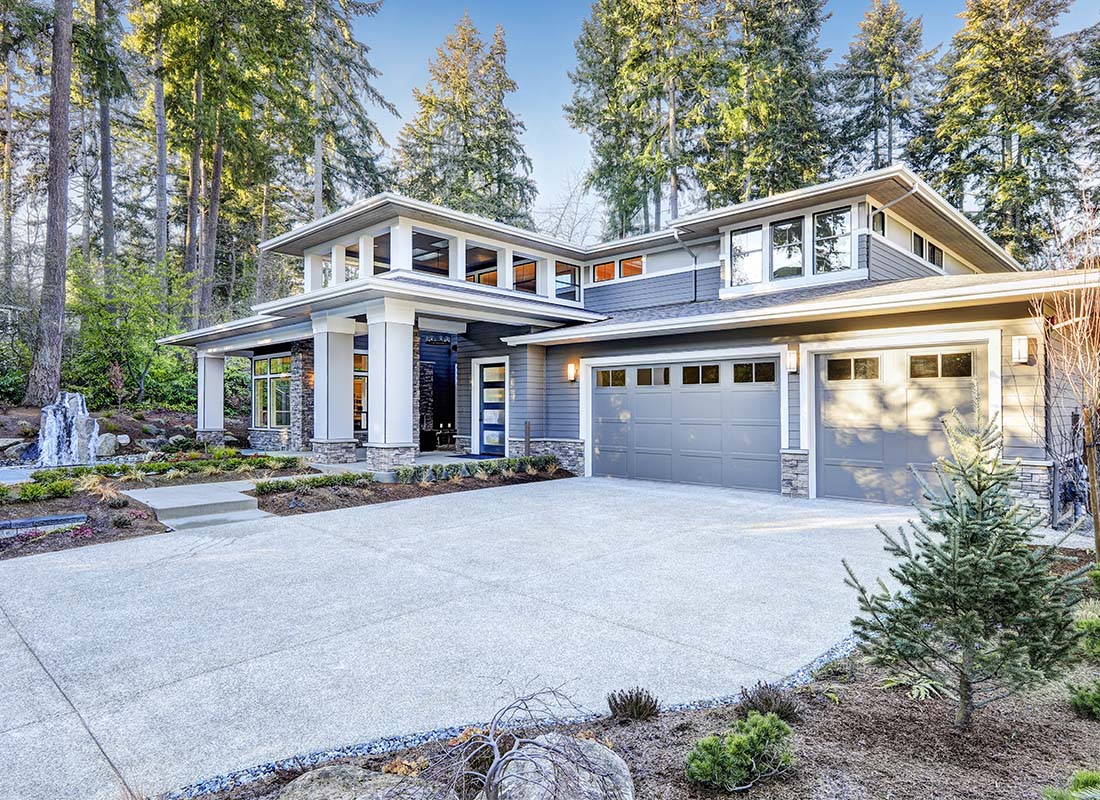
If you have more to protect, a high net worth insurance policy may help protect your large assets and cover your risks.
Protect your wealth with a high net worth insurance policy.
Despite the name, high net worth insurance isn’t simply a variation on ordinary personal insurance with higher coverage limits and higher premiums. Instead, it’s about recognizing that people with large assets have unique coverage needs.
Combines coverages based on your needs.
One way this type of insurance responds to this challenge is by bringing multiple areas of coverage and expertise together into a comprehensive insurance solution based on your individual needs. This usually includes coverage for your home or homes, vehicles, travel, and even life insurance. The solution is designed for your particular risks, assets, and lifestyle rather than simply combining off-the-shelf policy terms and conditions.

Whether entering from outside your home from a flood or from within your home’s plumbing system, water damage is the most common cause of loss to a home. Many policies exclude losses caused by backup of sewers and drains, and all unendorsed homeowner policies exclude damage caused by a flood.
Careful review is essential to protect your home and belongings from all sources of water damage. We recommend coverage solutions from insurance companies that include backup of sewers and drains. Also, identify cost efficient solutions to address the risk of flood damage in the first place.
Typically, there is a sublimit on homeowner insurance policies for valuable possessions, such as jewelry, furs, fine arts, and other collectibles.
Obtain a personal floater or schedule your valuable possessions to ensure you’ll have the money to replace them.
Collector or classic vehicles often have significant value and require special documentation and unique insurance coverage to ensure they are adequately protected. Even if stored on your property, they are typically not covered under your homeowners insurance.
Insure your collector cars with a specialized insurance company that focuses on and understands the unique nature of collector or classic cars and other vehicles.
With more smart technology in homes and technology at your fingertips, malware, hackers, and other cyber threats can jeopardize your security, finances, and reputation.
Identity theft, personal injury, and cyber risk coverage may be available as an important add-on coverage to your homeowners policy.
There are risks associated with employing domestic staff in your home. Employees can become injured on the job, leaving you to pay out-of-pocket for their medical expenses. Additionally, staff can sue for wrongful termination, privacy issues, discrimination, and harassment claims.
Be sure to obtain coverage for medical expenses when your staff are hurt while on the job. Additionally, employment practices liability insurance can protect you from high legal costs associated with lawsuits and additional claims from current and past employees.
When there is substantial damage to your home due to unexpected events such as lightning, fire, or a storm, you may not be able to live in your home until it can be repaired or rebuilt. As a result, you could incur additional living expenses for lodging, food, and other daily needs.
Look for coverage that provides higher limits to ensure that your schedule and your standard of living is not compromised. Additional living expense coverage compensates you for the costs incurred for housing and other living expenses if a covered event makes your home temporarily uninhabitable while it’s being repaired or rebuilt.
You invite guests over for a pool party and one of them dives into the shallow end of the pool and is permanently injured. They hire a lawyer to represent them and after a long legal battle, you and your family are left financially responsible for their injuries.
An excess liability (or umbrella policy) increases your personal liability limits by adding protection over and above your current auto, boat or homeowners policies. Excess liability insurance is available as separate coverage and offers additional peace-of-mind knowing that you have the protection you need.
Most fires are devastating. Besides the emotional impact, the physical damage to your home can be significant. If you lost your home to fire, do you have adequate insurance to replace your home and its contents? Remember, inflation rates on building materials and construction costs rarely track with real estate values. As a result, rebuilding a home can often cost significantly more than expected.
Make sure your homeowners policy contains replacement cost coverage with no cap. This protects you if the cost to reconstruct your home is higher than your current limit of coverage. And, be sure that your insurance includes rebuilding your home to code. Very often, local ordinances and building codes change over time, which may require additional costs.
In the unfortunate event that someone slips and falls while on your property, you and your family may be held liable for any injuries that result.
Your homeowners policy includes personal liability coverage to respond to incidents where injuries or damages occur to a third party where you may be deemed negligent. However, you should consider purchasing an excess liability policy to provide additional coverage limits to protect your assets in case a lawsuit is brought against you.
You do not have to live near a body of water to suffer loss due to flooding. With the changing weather patterns and more damaging storms occurring around the globe, flood losses are becoming more common in places that are not normally prone to flood damage. Your homeowners policy does not cover damage from flooding. Could your home be at risk?
Purchase a flood insurance policy to protect your home and covered contents from certain types of flood losses as designated by the National Flood Insurance Program (NFIP). In the U.S., a flood policy is purchased as a separate policy through the federal program (NFIP) or through a servicing carrier known as a write-your-own carrier. Additionally, you may be able to purchase excess limits on your homeowners policy to better protect your home.
Owning a secondary home or rental property has the potential of increasing your liability exposures.
Be certain that you extend the liability coverage under your homeowners policy to include your secondary home. You should also consider including the secondary home under an excess liability policy to provide for additional liability limits.
Traveling is exciting, but there are risks associated with every trip. Whether for work or pleasure, reducing stress always improves the travel experience. If you travel to another country, the insurance policies you have may not be applicable. Other things to consider are costs associated with crime, injury, or death while traveling.
Various types of travel insurance are available that may offer protection in case of lost baggage, trip cancellation or delays, or trip interruption. You may also want to consider policies that cover accidental death and dismemberment, as well as the repatriation of remains.
While your homeowners policy covers a wide array of perils, such as damage caused by a fire or a falling tree, it doesn’t cover some common types of problems that can occur to the equipment in or around your home. For example, a sudden surge from the local power plant might damage appliances, HVAC systems, or your home power generator.
Add mechanical breakdown coverage to your homeowners policy. If you have multiple homes, it can be purchased for each one individually. Keep in mind that while it does protect against major events, it does not cover normal wear and tear.
Planning a wedding, bar mitzvah, bat mitzvah, family reunion, or other private event is stressful enough. The last thing you should worry about is severe weather that could cause you to postpone the event. Or, what happens is a vendor goes out of business or declares bankruptcy before your event and you lose your deposit?
No matter how carefully you plan, things outside of your control can go wrong. Purchase insurance coverage for your event. It’s typically not very expensive and helps keep you focused on all of the things that go into making your event truly memorable.
Insurance companies often limit coverage to remediate mold that arises from a covered loss.
With many homeowners unaware of this risk or the limits of their own coverage, be sure to discuss the coverage options and loss prevention solutions to help reduce this risk.
A real-world example of how high net worth insurance works.
High net worth insurance is unique in how it is designed, and it shows in the way that it works. For example, you may want to look for insurance coverage that helps cover the costs to repair a damaged vehicle using the repair shop of your choice and factory-original parts. You may also want to have your vehicle insured for the agreed value rather than the market value. This means that you and the insurance company agree to the payout amount upfront in the event of a total loss claim.
Does your policy cover you while traveling?
Not all insurance companies offer coverage that extends to people who frequently travel outside of the country, so it’s important to select a policy that includes options such as auto liability, kidnap, ransom, and medical evacuation coverage.
Does your policy include coverage for your secondary home?
If you own multiple homes, you’ll need a high net worth insurance policy that extends liability coverage to your secondary home. Excess liability coverage may also be added for additional liability limits.
Specific coverage options for unique risks.
Of course, there are other unique risks to consider that might be more customized to your lifestyle. Household help, such as nannies or landscaping crews, identity theft, international travel, and more all have specialized insurance solutions to help protect your wealth.
Do you have more to protect? High net worth insurance may be tailored to meet the needs of your unique lifestyle. Contact us to go over your coverage options.
Let’s Get Started
High Net Worth Insurance Information Request
"*" indicates required fields
Don’t like forms? Call one of our locations today.
